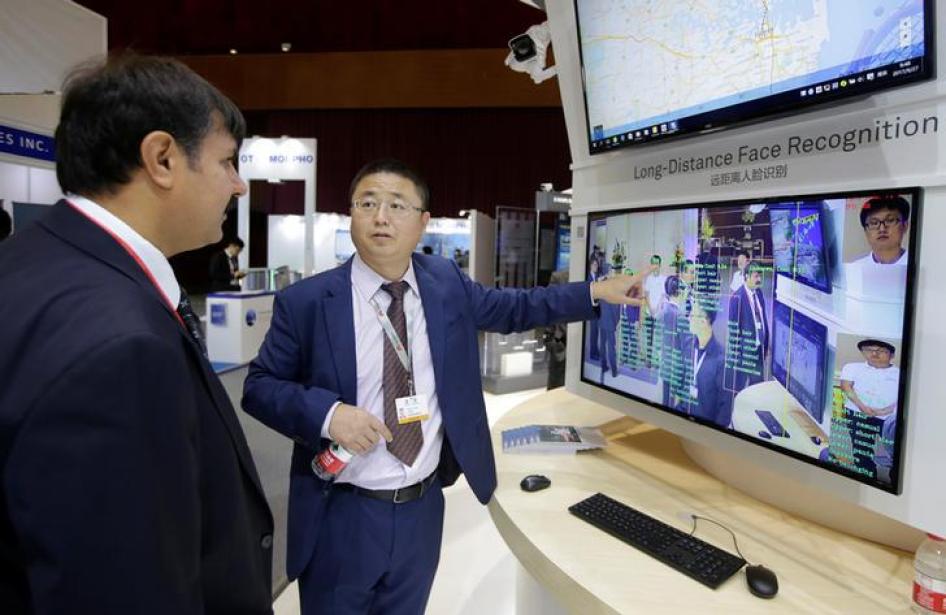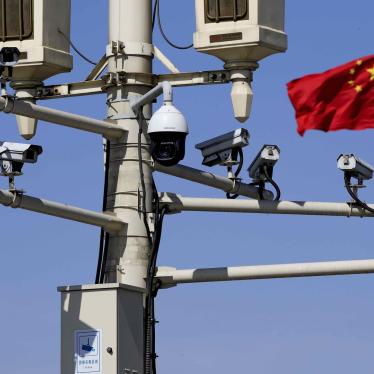The Chinese government shows no sign of relenting in its campaign of repression in the northwest region of Xinjiang, where an estimated million Turkic Muslims are indefinitely detained and abused. As scrutiny of the government’s horrific human rights record grows, it’s time to pay more attention to the presence and commercial activity of international firms operating there. U.S. companies with a presence in the region reportedly include Halliburton and the National Basketball Association.
Foreign firms have a history of aiding the Chinese government in its repressive activities. Technology companies are particularly at risk of this, given how intertwined their products and services can be in the Chinese government’s human rights violations. As far back as 2006, Human Rights Watch documented how Google, Microsoft, Skype and Yahoo all helped the Chinese government censor online speech. Yahoo’s willingness to share user data about Shi Tao, a journalist, with Chinese authorities after he sent a Chinese Communist Party document to an international website landed him a 10-year prison sentence. Public pressure forced some companies to change their policies, but others have looked the other way or appear inclined to revert to older habits.
In Xinjiang, which is rapidly turning into an unparalleled surveillance state, Chinese companies have already helped create tools used for repression. The Chinese company iFlytek has worked closely with China’s Public Security Bureau to develop a pilot surveillance system that can automatically identify targeted voices in phone conversations. The China Electronic Technology Group Corporation developed a mass surveillance system that enables authorities to monitor activities deemed “suspicious” and detain people in Xinjiang for lawful, nonthreatening behavior.
And in 2017, Human Rights Watch found that Thermo Fisher Scientific, a Massachusetts-based firm, had sold DNA sequencers to the Xinjiang Public Security Bureau. That same year, Human Rights Watch also documented Xinjiang authorities’ compulsory collection of DNA samples and other biodata from all residents between the ages of 12 and 65. While Thermo Fisher’s sales were in conformity with U.S. export controls, the company did not answer repeated queries about its ability to determine whether its technology was being used to further human rights violations. After scrutiny from members of Congress, Human Rights Watch and the media, the company eventually agreed to stop selling that particular technology in Xinjiang.
This might have been avoided — or at least handled more responsibly and transparently — if the company had undertaken appropriate “human rights due diligence.” Under the United Nations Guiding Principles on Business and Human Rights, businesses should put in place processes to identify, prevent, mitigate and account for their impact on human rights throughout their supply chains and operations. This could mean everything from whether products are being made using forced labor to whether technology is being used to collect, store or process information gathered without consent.
In practical terms, what would a robust human rights due diligence strategy look like for foreign technology companies in Xinjiang? First, firms should immediately assess the human rights risks. Is it possible that their equipment or services are being used for purposes other than what the company assumed or intended? Are its products being manufactured without labor rights abuses? For example, Badger Sportswear, a North Carolina-based manufacturer of athletic gear, learned through the media that there was a reasonable chance its products were being manufactured in part through forced labor in Xinjiang. The company quickly announced it would stop sourcing goods from its supplier in that region.
Second, companies should enlist the assistance of independent, third-party audits to check these assessments. Since authorities have placed restrictions on all manner of independent inquiries — including balking at allowing United Nations experts unfettered access to the region and organizing multiple tightly controlled visits for government-selected groups of diplomats and journalists — this step would be exceptionally difficult.
Third, companies should be transparent about whom they are doing business with in Xinjiang. They should publish the names of their local partners, suppliers and collaborators, including any government agencies, Public Security Bureau-affiliated research laboratories, or bingtuan, military-economic entities spread across the region.
Finally, these firms should publicly report on their human rights due diligence to show not just that they have a strategy, but also that they have applied it and assessed the risks.
The U.N. Guiding Principles are non-binding. But scrutiny of private-sector activities in Xinjiang is growing, and firms such as Thermo Fisher have learned the uncomfortable lesson that if they don’t take the initiative to protect rights, public and government scrutiny will most likely increase.
If firms cannot operate in Xinjiang while respecting rights, they should reconsider whether their presence there is worth the reputational risk and harm to human rights. Sending a clear message that companies insist on ethical operations might force Xinjiang authorities to think twice about their campaign of repression — and ensure that firms are not complicit in the worst Chinese government abuses since Tiananmen Square.









